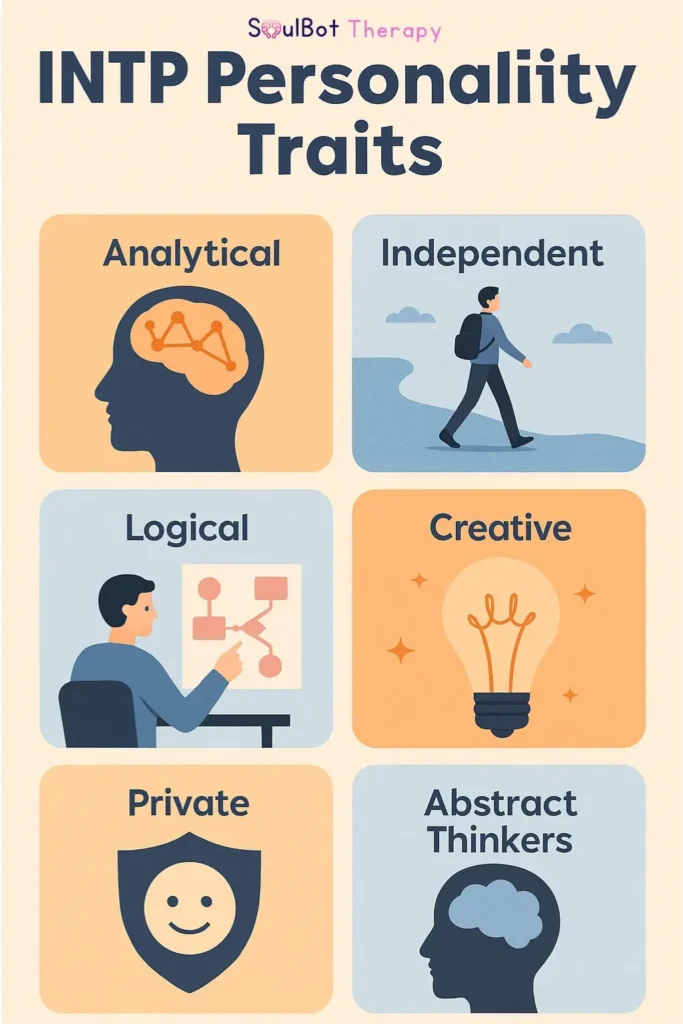Ever wonder what’s really happening inside an INTP’s head? The INTP personality type, often called The Logician, thrives on ideas, logic, and questioning reality itself. Their minds are like endless laboratories where theories form, shift, and evolve.
If you’ve ever been told you “overthink,” this guide will help you see how INTPs think, why they analyse everything, and how to turn their brilliant logic into action.
💬 Take our Free Personality Test or chat with SoulBot, your AI mental health companion, to manage overthinking loops and find balance.How does an INTP think?
To understand how INTPs think, picture a mental chessboard. Every thought is a potential move, and every move demands analysis.
INTPs rely on Introverted Thinking (Ti), an inward-focused function that constantly dissects information for accuracy and coherence. They balance this with Extraverted Intuition (Ne), which sparks endless curiosity and creative connections.
Core INTP logic patterns often look like this:
- Absorb information
- Analyse inconsistencies
- Rebuild a more transparent framework.
- Share insights — only when ready.
Their world revolves around truth-seeking and intellectual honesty, not surface-level opinions.
📊 SoulFact: According to Truity, INTPs make up about 3% of the population and are among the most intellectually independent types. (Truity – INTP Personality Type)
Why INTPs Question Everything
An INTP doesn’t just accept an answer; they test it. They question systems, beliefs, and even their own reasoning until the logic holds up. This makes them excellent problem-solvers but also prone to mental spirals.
They might spend hours exploring why things work a certain way, not for practical reasons but because understanding feels like purpose.
Strengths of the Analytical Mind
The analytical personality of an INTP gives them remarkable advantages in both creativity and clarity.
1. Innovative Problem-Solving
INTPs approach challenges like puzzles. They see angles others miss and find unconventional but effective solutions.
2. Independent Thinking
Their decisions come from internal logic, not social pressure. They’d rather be right quietly than follow the crowd loudly.
3. Adaptable Curiosity
Because they see patterns everywhere, they can pivot ideas quickly, making them natural inventors, philosophers, and thinkers.
4. Honest Reflection
INTPs rarely lie to themselves. When wrong, they adjust their theories, not their ego.
🧠 SoulTip: Pair thinking with grounding habits. Journaling, mindfulness, or daily structure helps channel INTP problem-solving into productive action instead of overanalysis.

INTP Challenges: Overthinking vs. Insight
The same mind that can solve complex theories can also overanalyse simple problems. That’s the paradox of how INTPs think in endless depth, but sometimes in infinite loops.
Common struggles include:
- Overthinking: Mental “what-ifs” delay action.
- Decision paralysis: Fear of imperfect logic stalls progress.
- Emotional detachment: Logic often wins over vulnerability.
🧠 SoulTip: Pair thinking with grounding habits. Journaling, mindfulness, or daily structure helps channel INTP problem-solving into productive action instead of overanalysis.
Practical Tips for Grounding INTP Logic in Action
- Set Thinking Deadlines: Give yourself a time limit before deciding that the analysis needs closure.
- Simplify Decisions: Not every problem deserves profound logic; save energy for what matters.
- Express Thoughts Out Loud: Talking or writing helps translate theory into clarity.
- Balance Logic with Empathy: Understanding feelings doesn’t cancel reason; it completes it.
Use AI Reflection Tools: SoulBot’s guided journaling and mood tracking can help INTPs organise thought patterns and manage overthinking loops.
💬Final Thought
The INTP mind is a masterpiece of logic, curiosity, and creativity. When they balance thought with action and insight with emotion, they become not just thinkers but visionaries who turn understanding into transformation.
🧠 Discover your full INTP Personality Result Page and learn how your logic shapes creativity.








